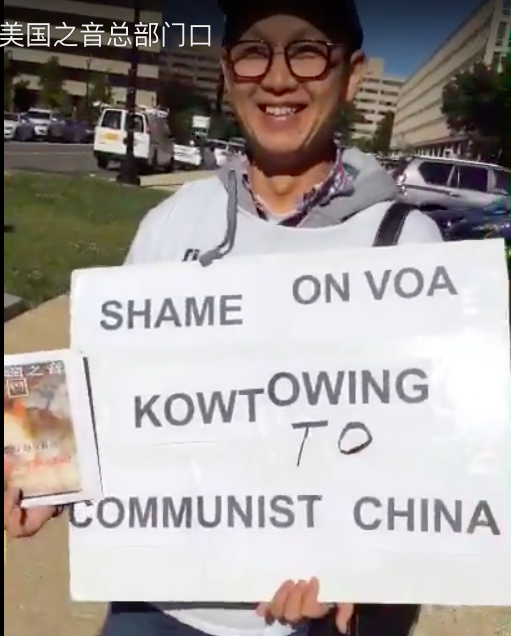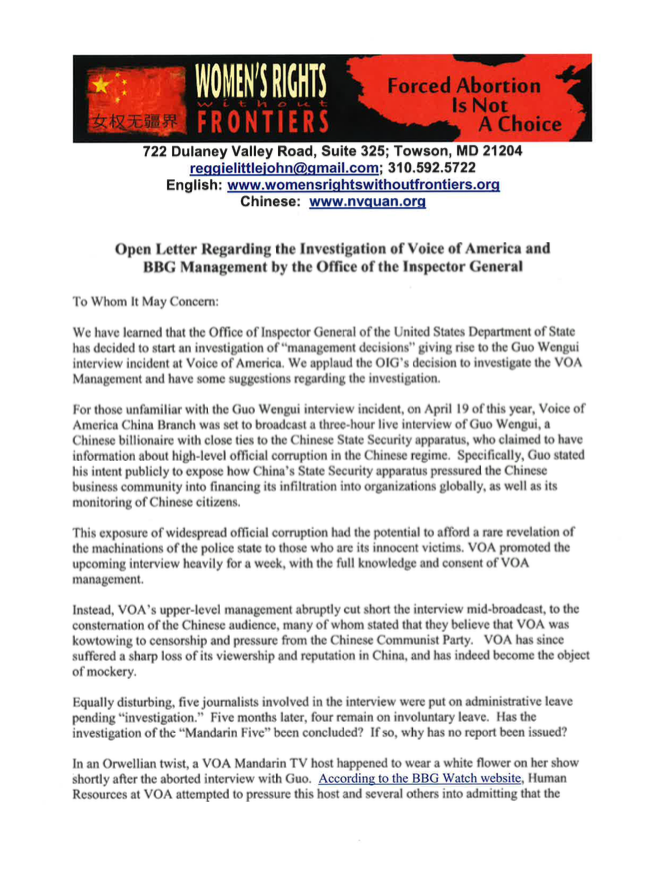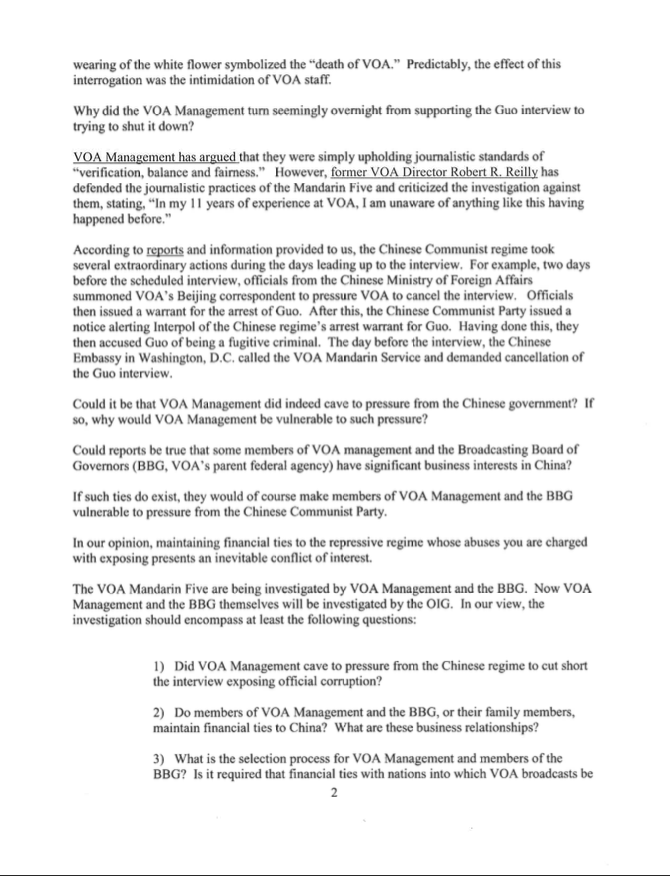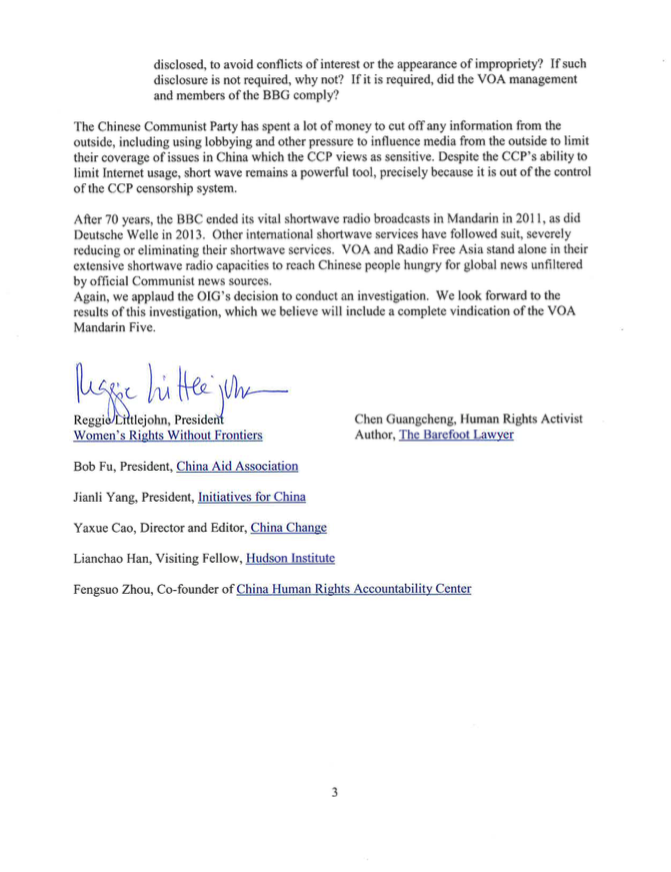BBG Watch Commentary EXCLUSIVE
Women’s Rights Without Frontiers, a U.S.-based international human rights group that opposes forced abortion and sexual slavery in China, has issued an open letter on the expected investigation by the U.S. Office of Inspector General (OIG) of “management decisions” at the Voice of America (VOA) and its parent federal agency, the Broadcasting Board of Governors (BBG), which led to the shortening of the live interview with Chinese whistleblower Guo Wengui. The open letter also comments on allegations of reprisals against VOA Mandarin Service journalists who opposed the management’s decisions to shorten the live interview. Human rights activists urge the OIG to investigate any potential personal conflicts of interests of VOA and BBG officials who may have significant business interests in China.

In addition to Women’s Rights Without Frontiers President Reggie Littlejohn, the open letter was signed by Chinese human rights activist Chen Guangcheng who now lives in exile in the United States, and several other Chinese rights defenders and scholars.
Both Reggie Littlejohn and Chen Guangcheng have participated in past Voice of America as well as Radio Free Asia (RFA) broadcasts to China, but they have been concerned for some time about management practices at VOA and BBG.
“Could reports be true that some members of VOA management and the Broadcasting Board of Governors (BBG, VOA’s parent federal agency) have significant business interests in China?,” Women’s Rights Without Frontiers asks in an open letter.
In raising questions about potential conflicts of interests, the women’s rights organization could have been relying on a Los Angeles Times report showing that former Democratic Chairman of the BBG Board, Jeff Shell, who still serves as a BBG Board member, signed a $450 million contract between Universal Filmed Entertainment group and a Chinese company in 2016. There are reports that a company run by VOA director Amanda Bennett’s husband does significant business in China.
Some of the past BBG Board members also had done corporate business in Vladimir Putin’s Russia.
“Do members of VOA Management and the BBG, or their family members, maintain financial ties to China?, Women’s Rights Without Frontiers asked, and “what are these business relationships?”
Technically, business deals of BBG and VOA officials or members of their families in China and Russia are not illegal if all U.S. laws are observed and they do not use their government positions, government employees or other public resources to help them in their private corporate activities. However, during the Cold War, such business activities by government officials in charge of U.S. government broadcasting were not tolerated because of potential conflicts of interest and potential pressure from hostile governments.
“If such ties do exist, they would of course make members of VOA Management and the BBG vulnerable to pressure from the Chinese Communist Party,” the human rights group observed. VOA and BBG officials have not commented publicly on the specific issue of potential conflicts of interests. VOA director Amanda Bennett stated that “the decisions regarding the interview with Guo Wengui were made by a group of senior VOA leaders led by director Amanda Bennett and included deputy director Sandy Sugawara, language program director Kelu Chao, and East Asia division director Norm Goodman.” She also said that “at no time during this decision-making process was there any management consideration of not doing the interview, nor of cutting short an ongoing interview for any reason.”
VOA director Amanda Bennett has argued that in ordering the Guo Wengui live interview to be shortened, she and the rest of the senior VOA management were simply upholding journalistic standards of “verification, balance and fairness.” “The decisions were based on the journalistic principles of verification, balance and fairness that are standard industry practice and apply universally to all VOA services,” Amanda Bennett said.
Four members of the U.S. Congress who serve on committees in the U.S. Senate and U.S. House of Representatives which oversee the operations of the Broadcasting Board of Governors and the Voice of America have submitted a written request to Inspector General Steve A. Linick in the Office of Inspector General for the U.S. Department of State & Broadcasting Board of Governors to conduct an investigation into the circumstances that led Voice of America management to place five employees of VOA’s Mandarin Service on administrative leave after the senior VOA managers abruptly ordered them to shorten a live broadcast with Chinese businessman-turned-whistleblower, Guo Wengui, on April 19, 2017.
The letter, dated August 28, 2017, was signed by a member of Senate Committees on Appropriations, Foreign Relations and Select Committee on Intelligence U.S. Senator Marco Rubio (R-FL); Chairman of the House Foreign Affairs Committee Rep. Edward Royce (R-CA); a senior member on the Foreign Affairs Committee and Co-Chairman and the highest-ranking House member of both the bipartisan House/Senate Commission on Security and Cooperation in Europe (CSCE), and the bipartisan House/Senate/White House Congressional-Executive Commission on China Rep. Chris Smith (R-NJ); and Commissioner of the Congressional-Executive Commission on China and Vice-Chairman of Terrorism and Illicit Finance Subcommittee Robert Pittenger (R-NC).
SEE: Members of Congress request OIG investigation of VOA and BBG handling of Guo Wengui interview EXCLUSIVE, BBG Watch, September 30, 2017.
Chinese Americans have been giving money to defend the suspended VOA Mandarin Service journalists. Chinese Americans have also staged protests in front of the Voice of America building in Washington, DC during which they performed a mock funeral to show that VOA has lost respect and credibility among the Chinese who defend human rights.

Guo Wengui who is also known as Miles Kwok and is China’s most famous billionaire businessman and whistleblower seeking political asylum in the United States was scheduled to speak at the Hudson Institute in Washington, DC on October 4, 2017. [The event may have been rescheduled, but BBG Watch was assured that it will take place.]
The Hudson Institute event will be moderated by Bill Gertz, senior editor at The Washington Free Beacon. Gertz is a national security columnist at The Washington Times, and author of The China Threat: How the People’s Republic Targets America.
The President and CEO of the Hudson Institute is Kenneth R. Weinstein who is also presidentially-appointed and Senate-confirmed Chairman of the Broadcasting Board of Governors , the overseeing board of VOA’s parent federal agency with its annual budget of $740 million (FY 2017).
Kenneth Weinstein, who is a Republican, replaced Jeff Shell as BBG Chairman when Donald Trump became president. The entire bipartisan BBG Board, however, was appointed during the Obama administration, as was VOA director Amanda Bennett and her boss, BBG CEO John F. Lansing. President Trump has not yet officially nominated a new BBG CEO. Documentary filmmaker, former PBS executive and former United States Information Agency (USIA) official Michael Pack is reported to be considered by the White House to be the next BBG CEO.
###
Open Letter Regarding the Investigation of Voice of America and BBG Management by the Office of the Inspector General
Posted on October 3, 2017 by Reggie Littlejohn

To Whom It May Concern:
We have learned that the Office of Inspector General of the United States Department of State has decided to start an investigation of “management decisions” giving rise to the Guo Wengui interview incident at Voice of America. We applaud the OIG’s decision to investigate the VOA Management and have some suggestions regarding the investigation.
For those unfamiliar with the Guo Wengui interview incident, on April 19 of this year, Voice of America China Branch was set to broadcast a three-hour live interview of Guo Wengui, a Chinese billionaire with close ties to the Chinese State Security apparatus, who claimed to have information about high-level official corruption in the Chinese regime. Specifically, Guo stated his intent publicly to expose how China’s State Security apparatus pressured the Chinese business community into financing its infiltration into organizations globally, as well as its monitoring of Chinese citizens.
This exposure of widespread official corruption had the potential to afford a rare revelation of the machinations of the police state to those who are its innocent victims. VOA promoted the upcoming interview heavily for a week, with the full knowledge and consent of VOA management.
Instead, VOA’s upper-level management abruptly cut short the interview mid-broadcast, to the consternation of the Chinese audience, many of whom stated that they believe that VOA was kowtowing to censorship and pressure from the Chinese Communist Party. VOA has since suffered a sharp loss of its viewership and reputation in China, and has indeed become the object of mockery.
Equally disturbing, five journalists involved in the interview were put on administrative leave pending “investigation.” Five months later, four remain on involuntary leave. Has the investigation of the “Mandarin Five” been concluded? If so, why has no report been issued?
In an Orwellian twist, a VOA Mandarin TV host happened to wear a white flower on her show shortly after the aborted interview with Guo. According to the BBG Watch website, Human Resources at VOA attempted to pressure this host and several others into admitting that the wearing of the white flower symbolized the “death of VOA.” Predictably, the effect of this interrogation was the intimidation of VOA staff.
Why did the VOA Management turn seemingly overnight from supporting the Guo interview to trying to shut it down?
VOA Management has argued that they were simply upholding journalistic standards of “verification, balance and fairness.” However, former VOA Director Robert R. Reilly has defended the journalistic practices of the Mandarin Five and criticized the investigation against them, stating, “In my 11 years of experience at VOA, I am unaware of anything like this having happened before.”
According to reports and information provided to us, the Chinese Communist regime took several extraordinary actions during the days leading up to the interview. For example, two days before the scheduled interview, officials from the Chinese Ministry of Foreign Affairs summoned VOA’s Beijing correspondent to pressure VOA to cancel the interview. Officials then issued a warrant for the arrest of Guo. After this, the Chinese Communist Party issued a notice alerting Interpol of the Chinese regime’s arrest warrant for Guo. Having done this, they then accused Guo of being a fugitive criminal. The day before the interview, the Chinese Embassy in Washington, D.C. called the VOA Mandarin Service and demanded cancellation of the Guo interview.
Could it be that VOA Management did indeed cave to pressure from the Chinese government? If so, why would VOA Management be vulnerable to such pressure?
Could reports be true that some members of VOA management and the Broadcasting Board of Governors (BBG, VOA’s parent federal agency) have significant business interests in China?
If such ties do exist, they would of course make members of VOA Management and the BBG vulnerable to pressure from the Chinese Communist Party.
In our opinion, maintaining financial ties to the repressive regime whose abuses you are charged with exposing presents an inevitable conflict of interest.
The VOA Mandarin Five are being investigated by VOA Management and the BBG. Now VOA Management and the BBG themselves will be investigated by the OIG. In our view, the investigation should encompass at least the following questions:
1) Did VOA Management cave to pressure from the Chinese regime to cut short the interview exposing official corruption?
2) Do members of VOA Management and the BBG, or their family members, maintain financial ties to China? What are these business relationships?
3) What is the selection process for VOA Management and members of the BBG? Is it required that financial ties with nations into which VOA broadcasts be disclosed, to avoid conflicts of interest or the appearance of impropriety? If such disclosure is not required, why not? If it is required, did the VOA management and members of the BBG comply?
The Chinese Communist Party has spent a lot of money to cut off any information from the outside, including using lobbying and other pressure to influence media from the outside to limit their coverage of issues in China which the CCP views as sensitive. Despite the CCP’s ability to limit Internet usage, short wave remains a powerful tool, precisely because it is out of the control of the CCP censorship system.
After 70 years, the BBC ended its vital shortwave radio broadcasts in Mandarin in 2011, as did Deutsche Welle in 2013. Other international shortwave services have followed suit, severely reducing or eliminating their shortwave services. VOA and Radio Free Asia stand alone in their extensive shortwave radio capacities to reach Chinese people hungry for global news unfiltered by official Communist news sources.
Again, we applaud the OIG’s decision to conduct an investigation. We look forward to the results of this investigation, which we believe will include a complete vindication of the VOA Mandarin Five.
Reggie Littlejohn, President
Women’s Rights Without Frontiers
Chen Guangcheng
Author, The Barefoot Lawyer
Bob Fu, President
China Aid Association
Jianli Yang, President
Initiatives for China
Yaxue Cao, Director and Editor
China Change
Lianchao Han, Visiting Fellow
Hudson Institute
Fengsuo Zhou, Co-founder
China Human Rights Accountability Center
Related links
“How China Managed to Muffle the Voice of America.” Sasha Gong, May 23, 2017
https://www.wsj.com/articles/how-china-managed-to-muffle-the-voice-of-america-1495580183
“The VOA Follows Good Journalistic Practice.” Amanda Bennett, May 26, 2017
https://www.wsj.com/articles/the-voa-follows-good-journalistic-practice-1495815429?mg=id-wsj
“VOA Should Come Clean on Mandarin Service.” Robert R. Reilly, June 4, 2017
https://www.wsj.com/articles/voa-should-come-clean-on-mandarin-service-1496603701
“Voice of America interrogates its Chinese TV host for wearing a white flower,” BBG Watch Commentary, August 27, 2017
https://bbgwatch.com/voice-of-america-interrogates-its-chinese-tv-host-for-wearing-a-white-flower/
BBC Chinese Service Makes Final Broadcast in Mandarin. March 28, 2011
http://www.bbc.com/news/world-asia-pacific-12864041
Deutsche Welle: Farewell to Shortwave Chinese Broadcasts, February 1, 2013
http://m.dw.com/zh/告别短波德国之声中文广播最后一次直播节目/av-16489448?&zhongwe


